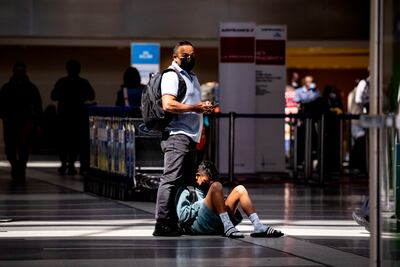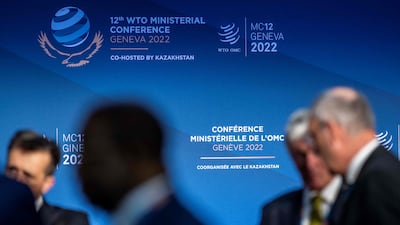There is no doubt that the ongoing Covid-19 pandemic has significantly curtailed global trade. According to the World Trade Monitor of the Netherlands Bureau for Economic Policy Analysis, trade volumes in 2020 fell to levels previously not seen since 2012, when the economy was struggling to emerge from the shockwaves of the financial crisis. The Organisation for Economic Co-operation and Development found that the value of products exported from its member countries declined by 8.2 per cent in 2020, while the value of service exports dropped by 16.7 per cent, driven largely by the near-total cessation of the travel and tourism sector.
The disruption caused to supply chains has been of particular concern, with sky-high freight costs, immobilised ports and general backlogs to production cycles upending the just-in-time manufacturing and distribution model. Every link on the chain was affected, too, from the sudden restrictions on the supply of raw materials to the drop in manufacturing output and delivery, meaning there was as much a problem with the “supply” as there was with the “chain”. According to Bank of America, Fortune 500 companies mentioned supply chains in their Q3 2021 earnings calls four times more than they did in Q2.
We have seen this in products as varied as semi-conductors, the unavailability of which impacted the burgeoning consumer electronics and electric vehicle sectors, and even the fruits and vegetables sector, which severely impacted growers and the communities they rely on in the developing world.
It became clear that the pandemic highlighted the fragility of the global trading system, and the degree to which countries have become almost entirely reliant on imports utilising transnational supply chains. Rather than the strengthening or diversification of those supply chains, we have seen an over-emphasis placed on local production and, in certain cases, creeping isolationism in which trade has become a political tool. The ongoing conflict in Ukraine, a major exporter of grains, has done little to ease this trend.
It is imperative, however, that we push back against such trends and remind ourselves of the benefits of the global trading system. To put it simply, trade increases the ability of nations to develop by opening up access to new markets, new customers, new ideas and new raw materials. Companies will have more opportunities to diversify and expand revenues, create employment and mitigate risk, while consumers benefit from greater choice, lower prices and new, innovative products. There is no growth – be it financial, social or intellectual – without trade, particularly in a developing world where, according to the International Monetary Fund, nations with liberal trade policies consistently grow faster than their isolated, protectionist peers.

The UAE has long understood this. With our strategic coastal position and need for goods that are beyond our ability to produce, we have always been an outward-looking nation, one with port cities that connect us to the wider Middle East and the Indian subcontinent. It is why trade became the focal point of our ambitious new economic agenda, which was crystallised in the Projects of the 50 last September.
Designed to both prepare for the economy and the challenges of the next 50 years and drive the recovery from Covid-19, its initiatives focus on accelerating industrial transformation, harnessing Fourth Industrial Revolution technologies, redirecting public- and select private-sector procurement back to the local economy and revising our visa, residency and employment laws.
Critically, the Projects of the 50 seek to establish a new era of stronger trade and investment agreements with the UAE’s key global partners – bilateral deals that will stimulate long-term, sustainable economic growth and cement the UAE’s position as a global economic hub. We have now signed our first two Comprehensive Economic Partnership Agreements and, in fact, our first ever bilateral trade deal with India – the world’s sixth-largest economy – and Israel. By reducing or eliminating tariffs, removing technical barriers to trade and increasing investment flows, these two deals alone will add more than $10.9 billion (Dh40bn) to our GDP in the next decade.
There are more deals to come. Negotiations are underway with Indonesia, Turkey and Colombia, and there is considerable interest from a number of other long-standing trade and investment partners. As such, our exports are now expected to expand by more than 6 per cent per year, according to Standard Chartered, surpassing a total value of $299.5bn (Dh1.1 trillion) by 2030. The UAE will, as a result, be a key driver of global trade growth.
We fully believe that other countries, especially those in the developing world, should follow suit. This is not the time to retreat inwards, but rather to seize the moment and open up their economies to the world, improve logistics infrastructure and further integrate into the global trade system. The reward is a faster, more inclusive and more sustainable recovery.
With that in mind, it is time for a new approach to governing global trade. Just as growing trade tensions in the 1980s led to a rethink of the world trade system in the 1990s, another is needed now to ensure transparent and predictable rules in the era of digital trade, cross-border data flows and creeping protectionism in areas such as intellectual property.
Sadly, the World Trade Organisation, formed in 1995, is yet to keep pace with the times. The body’s effectiveness is currently being hampered in three important ways: its inability to monitor how some members apply trade rules, the dysfunction of its Appellate Body and its accompanying dispute settlement function and, finally, its failure to establish a proper framework for digital trade until now.
Currently, disputes in these areas are being solved bilaterally or multilaterally, as in our own CEPAs, which have separate chapters on dispute resolution and digital trade. The US and Japan are also seeking to upgrade their economic alliance to include the rapid evolution of the digital economy. However, for a comprehensive impact and a level playing field, it is critical that the WTO creates new rules to address this vital area.
We are convinced that technology can drive a new era of sustainable trade growth, one that integrates and protects the interests of the developing world. Digital services – facilitated by online payments, digital documentation and, eventually, artificial intelligence, blockchain and the Internet of Things – promise an exciting new area of opportunity. In 2020, digitally deliverable services rose to account for 64 per cent of services exports, from 52 per cent in 2019. However, this sector can’t fully prosper if data localisation policies and regulatory gaps in digital payments continue to create hurdles.
We put these ideas forward at the 12th WTO Ministerial Conference – or MC12 – as we pressed for a collective approach to addressing the issues undermining global trade. We made the case to the international community that the multilateral, integrated trading system remains a catalyst for growth, development, job creation, poverty alleviation and social mobility. And, as we navigate today’s choppy economic waters, we must now work to ensure that these efforts also serve the needs of the new, digitally powered global economy.
We in the UAE are ready to do our part.


